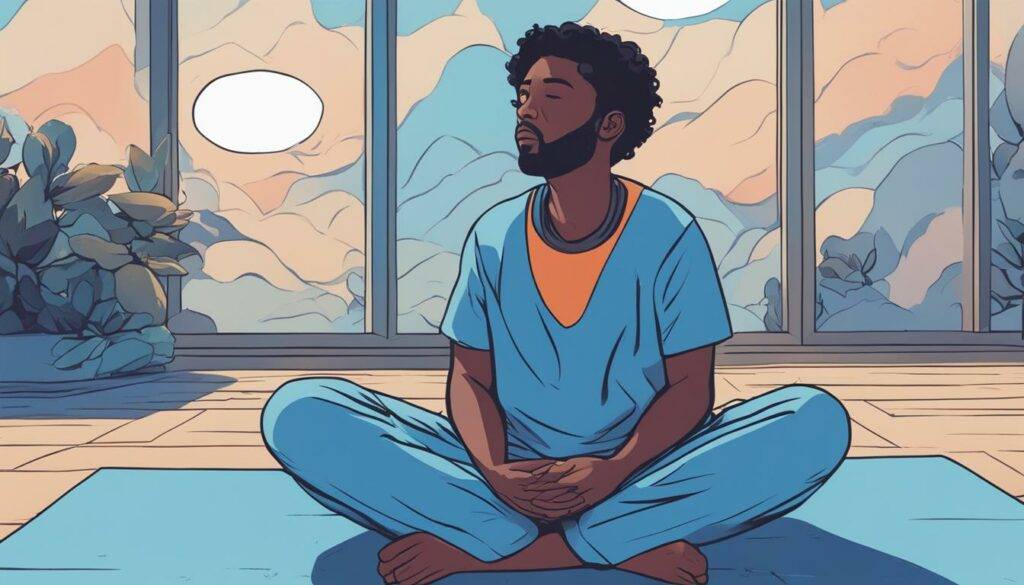Discover the transformative power of meditation for anxiety and depression relief. In this article, we explore the various types of meditation techniques that can help you find inner peace and mental well-being. Whether you’re struggling with anxiety, depression, or simply seeking stress relief, meditation can be a powerful tool in your journey towards emotional balance and self-discovery.
For centuries, meditation has been practiced as a means of quieting the mind and cultivating mindfulness. Now, scientific research is shedding light on its profound impact on mental health. By incorporating meditation into your daily routine, you can tap into its therapeutic benefits and unlock a sense of calm and clarity.
Key Takeaways:
- Meditation offers potential benefits in treating anxiety and depression
- Types of meditation, such as mindfulness and loving-kindness, can reduce symptoms
- Mindfulness-Based Stress Reduction is an 8-week program that combines meditation and movement exercises for stress management
- Breath awareness and body scan meditation promote relaxation and improve mental health
- Other meditation techniques, like transcendental meditation and walking meditation, are effective in reducing stress and anxiety
Different Types of Meditation for Anxiety and Depression Relief
Mental health meditation is a powerful tool for managing anxiety and depression. There are various meditation techniques that can be practiced to promote wellness and alleviate symptoms. Let’s explore some of the different types of meditation that can be beneficial for those dealing with anxiety and depression.
Mindfulness Meditation
One of the most scientifically supported forms of meditation is mindfulness meditation. It involves cultivating moment-to-moment awareness of your thoughts, feelings, and sensations without judgment. By focusing on the present moment, mindfulness meditation can help reduce anxiety, depression, and stress. It allows you to observe your thoughts without getting caught up in them, promoting a sense of calm and clarity.
Loving-kindness Meditation
Loving-kindness meditation is a practice of cultivating love, compassion, and kindness towards oneself and others. By repeating specific phrases or mantras, you can generate feelings of goodwill and empathy. This meditation technique has been shown to enhance positive emotions, reduce negative emotions, and increase social connectedness. It can be particularly helpful for individuals experiencing self-criticism or difficulty in managing relationships.
Compassion Meditation
Compassion meditation involves developing a deep sense of compassion and empathy for oneself and others. It focuses on recognizing the suffering that exists in the world and cultivating a genuine desire to alleviate it. This practice has been found to increase feelings of empathy, reduce self-criticism, and enhance overall well-being. Compassion meditation can be especially beneficial for individuals dealing with high levels of stress or trauma.

The Benefits
- Promotes relaxation and stress reduction
- Improves self-awareness and emotional regulation
- Enhances positive emotions and reduces negative emotions
- Increases resilience and coping strategies
- Improves overall well-being and mental health
By incorporating different types of meditation into your daily routine, you can effectively manage anxiety and depression, and improve your overall mental health and well-being. Whether you choose mindfulness, loving-kindness, or compassion meditation, the key is to practice regularly and find the technique that resonates with you the most.
Mindfulness-Based Stress Reduction for Anxiety and Depression
Mindfulness-Based Stress Reduction (MBSR) is a powerful self-care practice that can greatly benefit individuals struggling with anxiety and depression. By incorporating mindfulness meditation into your daily routine, you can develop the skills and awareness necessary to manage stress and promote overall well-being.
MBSR is an 8-week program that combines mindfulness practices, movement exercises, and teachings to cultivate a greater sense of awareness and resilience. This program has been extensively researched and has shown promising results in reducing symptoms of anxiety, depression, and panic.
Through the practice of mindfulness, you will learn to focus your attention on the present moment, without judgment or attachment to thoughts and emotions. This can help you gain a new perspective on stressful situations and develop a greater sense of self-awareness.
By participating in MBSR, you will be guided through various mindfulness meditation techniques, body scan exercises, and gentle movements. These practices can help you cultivate a deep sense of relaxation, reduce negative emotions, and increase your ability to cope with the challenges of anxiety and depression.

Table: Summary of Mindfulness-Based Stress Reduction Program
| Week | Topics Covered | Practices |
|---|---|---|
| 1 | Introduction to mindfulness | Body scan meditation, seated meditation |
| 2 | Awareness of breath and sensations | Walking meditation, mindful eating |
| 3 | Exploring thoughts and emotions | Thought labeling, loving-kindness meditation |
| 4 | Self-compassion and acceptance | Self-compassion meditation, gratitude practice |
| 5 | Stress and resilience | Yoga, body scan meditation |
| 6 | Emotion regulation and coping | Rainbow meditation, breath awareness |
| 7 | Communication and relationships | Loving-kindness meditation, mindful listening |
| 8 | Integration and sustaining practice | Seated meditation, body scan |
By completing the MBSR program, you will acquire valuable tools and techniques to navigate the challenges of anxiety and depression. The program can be a transformative journey towards greater self-awareness, resilience, and well-being. Remember, self-care is an essential part of managing anxiety and depression, and MBSR offers a holistic approach to support your mental health.
Breathing Practices and Body Scan Meditation for Mental Health
When it comes to finding relaxation techniques for mental health, breathing practices and body scan meditation are highly effective. These practices can help you calm your mind, reduce stress, and promote overall well-being. By incorporating these techniques into your daily routine, you can find relief from anxiety and depression and cultivate a greater sense of inner peace.
The Power of Breath Awareness Meditation
One of the fundamental components of many meditation practices is breath awareness meditation, also known as mindful breathing. This practice involves focusing your attention on your breath, observing each inhalation and exhalation without judgment. By bringing your attention to the present moment through the breath, you can quiet the mind and reduce emotional reactivity. Breath awareness meditation has been shown to have numerous benefits, including stress reduction, increased self-awareness, and improved emotional well-being.
Exploring Body Scan Meditation
Another powerful technique for promoting relaxation and improving mental health is body scan meditation. This practice involves systematically focusing on different parts of your body, from head to toe, and noticing any sensations or tension that may be present. As you bring your awareness to each part of your body, you can intentionally release any tension or discomfort through deep breathing. Body scan meditation can help you develop a greater sense of body awareness, observe thoughts and feelings without attachment, and reduce stress reactions.
By incorporating breath awareness meditation and body scan meditation into your daily routine, you can enhance your mental well-being and find relief from anxiety and depression. These practices can be done in the comfort of your own home, and they require no special equipment or prior experience. Take a few minutes each day to prioritize your mental health and engage in these powerful meditation techniques. You’ll soon discover the transformative benefits they can bring to your life.

Other Meditation Techniques for Anxiety and Depression Relief
While mindfulness meditation and loving-kindness meditation are widely recognized for their benefits in managing anxiety and depression, there are other meditation techniques that can also provide relief and relaxation for mental health. These techniques offer different approaches to calming the mind and reducing stress. Let’s explore some of these techniques:
Transcendental Meditation (TM)
Transcendental Meditation is a technique that uses sound or a personal mantra as an anchor for meditation. By repeating a specific sound or phrase, practitioners aim to transcend the surface level of thinking and enter a state of deep relaxation and self-awareness. Transcendental Meditation has been shown to reduce stress, depression, and burnout, making it an effective tool for managing anxiety and depression.
Walking Meditation
Walking meditation combines the benefits of aerobic exercise with mindfulness practice. During a walking meditation, individuals focus their attention on the sensations of walking, such as the movement of their feet and the rhythm of their breath. This practice has been found to reduce symptoms of depression and anxiety, providing a refreshing and calming experience for the mind and body.
Yoga
Yoga is a holistic practice that incorporates physical postures, breathing techniques, and meditation. It has been widely studied and found to be effective in managing anxiety, depression, and panic. The combination of movement, breath control, and mindfulness in yoga helps to release tension, promote relaxation, and improve mental well-being. Regular yoga practice can have significant benefits for individuals with anxiety and depression.
Chanting and Visualization Meditation
Chanting and visualization meditation techniques involve using specific sounds or mental images to focus the mind and induce a state of calm. Chanting can help to quiet the mind and reduce anxiety, while visualization allows individuals to create positive mental imagery and cultivate feelings of peace and relaxation. These techniques can be practiced independently or as part of a guided meditation to enhance the overall meditation experience.
| Technique | Benefits |
|---|---|
| Transcendental Meditation (TM) | Reduces stress, depression, and burnout |
| Walking Meditation | Calms the mind, reduces symptoms of depression and anxiety |
| Yoga | Manages anxiety, depression, and panic, promotes relaxation |
| Chanting and Visualization Meditation | Quiets the mind, reduces anxiety, cultivates peace and relaxation |
These meditation techniques offer individuals with anxiety and depression a variety of options to choose from based on their preferences and needs. Whether it’s finding stillness through sound and mantra, incorporating mindfulness into movement, or utilizing the power of visualization, these techniques can be valuable tools for stress relief and relaxation for mental health.
The Benefits of Meditation for Anxiety and Depression
Meditation has emerged as a powerful practice for promoting mental health and well-being. For individuals struggling with anxiety and depression, incorporating meditation into their daily routine can have numerous benefits.
One of the key advantages of meditation is that it helps you gain a new perspective on stressful situations. By practicing mindfulness, you develop the ability to observe your thoughts and emotions without judgment. This increased self-awareness can help you better understand the root causes of your anxiety and depression, allowing you to respond to challenging situations with greater clarity and calmness.
In addition to improving your emotional well-being, meditation can also have a positive impact on your physical health. Studies have shown that meditation can lower resting heart rate and blood pressure, reducing the physiological symptoms of stress. Furthermore, regular meditation practice has been associated with improved sleep quality, which is crucial for managing anxiety and depression.
When it comes to managing anxiety and depression, finding effective tools and techniques is essential. Meditation offers a holistic approach that not only targets the symptoms of anxiety and depression but also addresses their underlying causes. By cultivating mindfulness and self-awareness, you can develop the skills and resilience needed to navigate life’s challenges with greater ease and grace.
Table: Benefits of Meditation for Anxiety and Depression
| Benefit | Description |
|---|---|
| Stress Reduction | Meditation helps you manage stress by promoting relaxation and reducing emotional reactivity. |
| Improved Sleep | Regular meditation practice can improve sleep quality, helping to alleviate symptoms of anxiety and depression. |
| Enhanced Self-Awareness | Meditation cultivates self-awareness, allowing you to better understand the root causes of your anxiety and depression. |
| Emotional Regulation | By practicing mindfulness, you can develop skills to regulate your emotions and respond to challenging situations with greater clarity. |
| Physical Health Benefits | Meditation has been shown to lower resting heart rate and blood pressure, reducing the physiological symptoms of stress. |
While meditation is not a replacement for professional medical treatment, it can be a valuable addition to your overall mental health care routine. By dedicating just a few moments each day to quieting your mind and connecting with your inner self, you can experience the profound benefits of meditation for anxiety and depression relief.
Conclusion
Meditation has emerged as an effective tool for managing anxiety and depression. By incorporating various techniques, individuals can find relief from their symptoms and improve their overall well-being. From practicing mindfulness meditation to cultivating loving-kindness, there are several approaches to choose from.
Mindfulness-Based Stress Reduction (MBSR) has shown remarkable success in reducing anxiety, depression, and panic. This 8-week program combines mindfulness meditation, movement exercises, and teachings to develop stress management skills and promote self-care.
Additional techniques like breath awareness, body scan meditation, and yoga can also be beneficial for relaxation and mental health. They help calm the mind, reduce stress reactions, and promote a sense of peace and balance.
Incorporating meditation into a comprehensive approach to mental health can help you find relief from anxiety and depression. By utilizing stress relief and relaxation techniques like meditation, you can embark on a journey towards a more serene and balanced life.
FAQ
Can meditation really help with anxiety and depression?
Yes, various types of meditation, such as mindfulness meditation and loving-kindness meditation, have been shown to reduce symptoms of depression and anxiety. Meditation can also help in managing stress and promoting relaxation, which are important for mental health.
What are some popular types of meditation for anxiety and depression?
Mindfulness meditation, loving-kindness meditation, and compassion meditation are some of the popular types of meditation that can benefit individuals with depression and anxiety.
What is Mindfulness-Based Stress Reduction (MBSR) and how can it help with anxiety and depression?
MBSR is an 8-week program that incorporates mindfulness meditation to help individuals manage stress and promote overall well-being. It has been found to be effective in reducing symptoms of anxiety, depression, and panic.
How can breath awareness and body scan meditation help with anxiety and depression?
Breath awareness meditation can help in calming the mind and reducing emotional reactivity. Body scan meditation involves focusing on different parts of the body and deep breathing, leading to better observation of thoughts, feelings, and sensations, as well as a reduction in stress reactions.
Are there any other meditation techniques that can help with anxiety and depression?
Yes, transcendental meditation, walking meditation, yoga, chanting, and visualization techniques can also be used to focus the mind, reduce anxiety and stress, and promote mental health.
What are the benefits of meditation for anxiety and depression?
Meditation can help in gaining a new perspective on stressful situations, building skills to manage stress, increasing self-awareness, reducing negative emotions, improving sleep quality, and promoting relaxation. It has also been associated with lower resting heart rate and blood pressure, as well as increased imagination and creativity.




























































